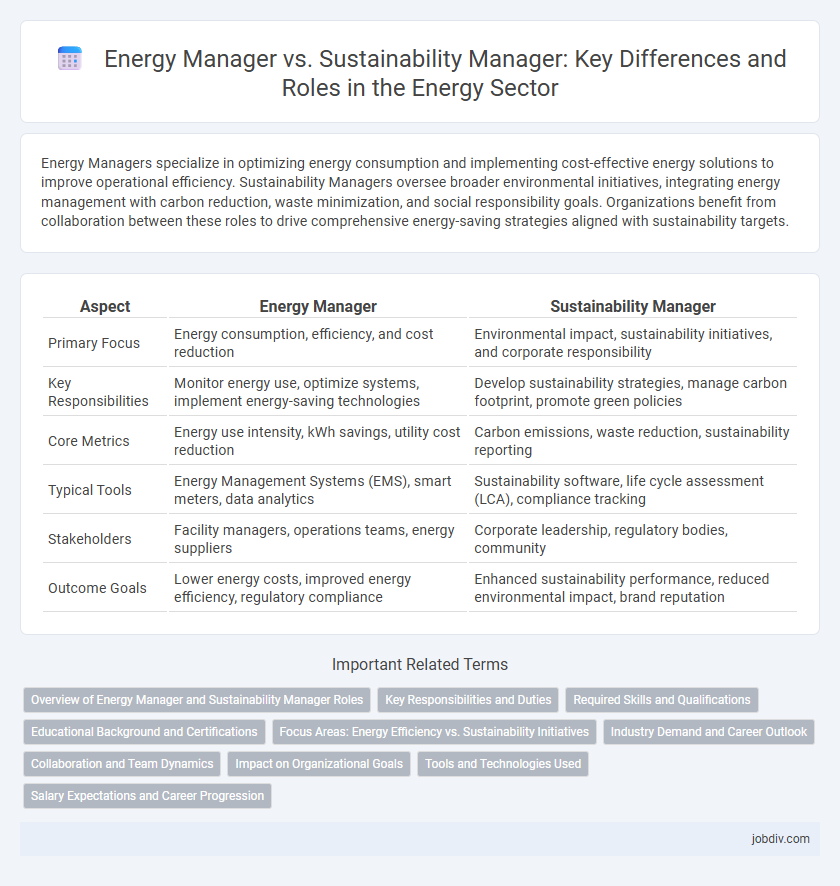Energy Managers specialize in optimizing energy consumption and implementing cost-effective energy solutions to improve operational efficiency. Sustainability Managers oversee broader environmental initiatives, integrating energy management with carbon reduction, waste minimization, and social responsibility goals. Organizations benefit from collaboration between these roles to drive comprehensive energy-saving strategies aligned with sustainability targets.
Table of Comparison
| Aspect | Energy Manager | Sustainability Manager |
|---|---|---|
| Primary Focus | Energy consumption, efficiency, and cost reduction | Environmental impact, sustainability initiatives, and corporate responsibility |
| Key Responsibilities | Monitor energy use, optimize systems, implement energy-saving technologies | Develop sustainability strategies, manage carbon footprint, promote green policies |
| Core Metrics | Energy use intensity, kWh savings, utility cost reduction | Carbon emissions, waste reduction, sustainability reporting |
| Typical Tools | Energy Management Systems (EMS), smart meters, data analytics | Sustainability software, life cycle assessment (LCA), compliance tracking |
| Stakeholders | Facility managers, operations teams, energy suppliers | Corporate leadership, regulatory bodies, community |
| Outcome Goals | Lower energy costs, improved energy efficiency, regulatory compliance | Enhanced sustainability performance, reduced environmental impact, brand reputation |
Overview of Energy Manager and Sustainability Manager Roles
Energy Managers oversee the optimization of energy consumption by implementing strategies to enhance efficiency and reduce operational costs within organizations. Sustainability Managers focus on broader environmental goals, integrating energy management with resource conservation, waste reduction, and sustainable development initiatives. While Energy Managers concentrate primarily on energy use and cost savings, Sustainability Managers develop comprehensive programs that address organizational impacts on the environment and promote long-term sustainability.
Key Responsibilities and Duties
Energy Managers focus on optimizing energy usage, implementing energy-saving initiatives, and monitoring consumption to reduce costs and environmental impact. Sustainability Managers oversee broader corporate social responsibility programs, including environmental compliance, sustainable development, and stakeholder engagement. Both roles require data analysis and reporting but differ in scope, with Energy Managers concentrating on energy efficiency and Sustainability Managers addressing comprehensive sustainability strategies.
Required Skills and Qualifications
Energy Managers require expertise in energy auditing, data analysis, HVAC systems, and compliance with energy regulations, often holding certifications like Certified Energy Manager (CEM). Sustainability Managers need a strong background in environmental science, corporate social responsibility, and sustainability reporting frameworks such as GRI or SASB, along with skills in stakeholder engagement and project management. Both roles demand proficiency in regulatory knowledge, but Energy Managers emphasize technical energy systems while Sustainability Managers focus on broader environmental and social impact strategies.
Educational Background and Certifications
Energy Managers typically hold degrees in engineering, environmental science, or energy management, with certifications such as Certified Energy Manager (CEM) or Energy Manager in Training (EMIT) enhancing their expertise. Sustainability Managers often possess educational backgrounds in environmental studies, sustainability, or business administration, supported by credentials like LEED Accredited Professional (LEED AP) or Sustainability Excellence Associate (SEA). Both roles prioritize specialized training to address energy efficiency and sustainable development effectively.
Focus Areas: Energy Efficiency vs. Sustainability Initiatives
Energy Managers prioritize energy efficiency by optimizing consumption, implementing energy-saving technologies, and monitoring utility performance to reduce operational costs. Sustainability Managers focus on broader sustainability initiatives, integrating environmental stewardship, social responsibility, and long-term resource management into corporate strategies. Both roles contribute to reducing carbon footprints, but Energy Managers zero in on energy-specific performance while Sustainability Managers address holistic ecological impacts.
Industry Demand and Career Outlook
Energy Managers are increasingly sought after in manufacturing and industrial sectors to optimize energy consumption and reduce operational costs, reflecting strong demand driven by rising energy prices and regulatory pressures. Sustainability Managers have a broader role encompassing environmental compliance, corporate social responsibility, and long-term resource management, with growing opportunities linked to expanding ESG (Environmental, Social, Governance) initiatives. Career outlook for Energy Managers remains robust in sectors prioritizing energy efficiency, while Sustainability Managers benefit from cross-industry growth as businesses integrate sustainable practices into strategic planning.
Collaboration and Team Dynamics
Energy Managers and Sustainability Managers often collaborate closely to align energy efficiency initiatives with broader environmental goals, fostering integrated strategies that reduce carbon footprints. Effective team dynamics emerge when these roles emphasize transparent communication, shared metrics, and mutual accountability, ensuring projects meet both operational energy targets and corporate sustainability commitments. Leveraging complementary expertise, such as energy auditing and sustainability reporting, enhances cross-functional collaboration, driving holistic organizational impact.
Impact on Organizational Goals
Energy Managers drive organizational goals by optimizing energy consumption, reducing operational costs, and enhancing energy efficiency, directly impacting financial performance and compliance with energy regulations. Sustainability Managers focus on broader environmental and social metrics, integrating sustainability initiatives that promote long-term corporate social responsibility and stakeholder engagement. Both roles contribute to organizational goals, with Energy Managers targeting cost and resource optimization, while Sustainability Managers advance strategic sustainability commitments and brand reputation.
Tools and Technologies Used
Energy managers utilize advanced energy management systems (EMS), smart meters, and IoT devices to monitor, control, and optimize energy consumption in real-time across facilities. Sustainability managers rely on life cycle assessment (LCA) software, carbon footprint calculators, and sustainability reporting platforms to track environmental impact and compliance with regulatory frameworks. Both roles increasingly leverage big data analytics and AI-driven tools to enhance decision-making and implement strategic energy and sustainability initiatives.
Salary Expectations and Career Progression
Energy Managers typically earn an average salary ranging from $70,000 to $100,000 annually, with career progression leading to senior energy specialist or director roles focused on optimizing energy consumption and cost savings. Sustainability Managers command higher salaries, averaging between $80,000 and $120,000, reflecting their broader responsibility for environmental impact, corporate social responsibility, and long-term sustainability strategies, often advancing to chief sustainability officer positions. Both roles offer strong career growth potential, but Sustainability Managers generally have a wider scope influencing corporate policy and stakeholder engagement.
Energy Manager vs Sustainability Manager Infographic

 jobdiv.com
jobdiv.com